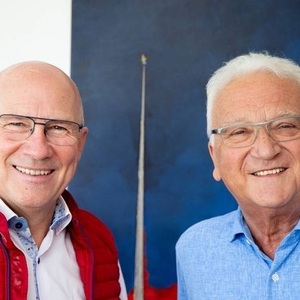BDI celebrates 25 years

SOURCE: BDI
October 27, 2021
BY BDI
BDI-Anlagenbau GmbH was founded on 12 September 1996. Today, the company is part of the internationally operating BDI Group.
BDI’s affiliated companies are showcasing the thought leadership and expertise of the Styrian business landscape. Their approach to technology and innovation is unrivalled and has transformed BDI into global industry leaders specializing in areas including plant manufacturing for renewable energy and production of high-quality algal recyclables.
It has been 25 years since the Spice Girls entered the charts with their song “Wannabe” and Roland Emmerich’s blockbuster “Independence Day” was screened at movie theaters, Germany became European soccer champions thanks to Oliver Bierhoff’s goal and Damon Hill was crowned Formula 1 world champion. It has also been 25 years since Wilhelm Hammer and Helmut Gößler launched BDI-Anlagenbau GmbH. On Sept. 12, 1996, an impressive corporate history began, achieving numerous successes and milestones. Twenty-five years later, BDI Holding GmbH today operates a financially strong holding company as part of the internationally operating BDI Group Their HQ is based in the Styrian town of Raaba-Grambach alongside their subsidiaries BDI-BioEnergy International GmbH, BDI-BioLife Science GmbH and BDI-Betriebs GmbH.
Technological pioneer for 25 years
The ongoing development of new technologies has always been deeply and firmly ingrained in BDI’s corporate philosophy. For instance, BDI-BioEnergy International GmbH has established its own consulting department GreenTech Solutions. Equipped with high-end engineering competencies and supported by state-of-the-art test and laboratory facilities, an interdisciplinary team of experts offers tailor-made services in all phases of the technological development – from concept to market.
Advertisement
Innovative pioneer for 25 years
BDI gained international acclaim for its outstanding competences in both in-house development and the implementation of forward thinking and environmentally friendly technologies. The latter enables the profitable manufacturing of renewable energies through waste products and residual materials. BDI-BioEnergy International GmbH was in fact the first ever company to build industrial plants worldwide to convert used cooking oil and animal waste fats into top-quality biodiesel.
Exemplary visionary for 25 years
Many of their patented technologies are the result of a long-term collaboration with local Styrian colleges including the University of Technology in Graz and the University of Graz. Among these technologies, is RepCAT (Repeatable Catalyst), an environmentally friendly biodiesel manufacturing process with a recyclable catalytic converter. Development and progress are driven by research which is a core activity for BDI. For over a decade, BDI Group has been examining algae as a sustainable energy source. Using their in-house developed cultivation technology at the production site in Hartberg, BDI-BioLife Science GmbH manufactures natural premium algal recyclables that are distributed globally for use in the nutritional supplement and cosmetics industries.
Wilhelm Hammer, company founder/majority shareholder, said “Many people have contributed to the success of BDI over the past 25 years. I am more than delighted that so many of them are still with us today to celebrate this anniversary. Their commitment, expertise and patience has helped us shape BDI from the early years on.
“Ever since BDI’s launch, I have been dedicated to the international marketing of biodiesel plants, continuously refining the use of groundbreaking technology.
Advertisement
“Our global biodiesel plants produce fuel that could not be any greener. The plants ensure the intelligent decentralization of waste and residual materials processing - with a high local value added.
“Our track record has been green and clean since the company’s founding – and we continue this today by cultivating algal recyclables. With this “fresh-juicy-Styrian” natural product, we supply the international cosmetics and nutritional supplement industries and are on our way to conquer the world.
“We have still have a few tricks up our sleeve. With a new intelligent recycling technology, we‘ll wage war against plastic trash.”
Helmut Gössler, executive partner, said “As BDI’ co-founder, I have always been dedicated to the idea of putting innovative concepts into practice. We were forerunners in the field of biodiesel production, and by building the world’s first multi-feedstock plant in the USA, we led the way of development in that technology.
“Over the past 25 years, we have been focusing on our goal – our competence in development & implementation of resource-friendly technologies. Together with a team of creative and highly motivated experts, we have realized more than 70 international projects. Having set up BioLife Science, we can also use our research knowledge in new market segments like the production of natural algal recyclables. I am very proud to be part of this success story.”
Related Stories
The European Commission on July 18 announced its investigation into biodiesel imports from China is now complete and did not confirm the existence of fraud. The commission will take action, however, to address some systemic weaknesses it identified.
Kintetsu World Express Inc. has signed an additional agreement with Hong Kong, China-based Cathay Pacific Airways for the use of sustainable aviation fuel (SAF). The agreement expands a three-year partnership between the two companies.
Broco Energy on July 17 announced a new partnership with the Massachusetts Port Authority (Massport) to deliver and transition Massport's fuel tanks to renewable diesel across its various facilities.
Shell Aviation, Accenture, and Amex GBT on July 10 announced Avelia is in the process of evolving to an industry solution with independent data hosting and a multi-supplier model helping users access the GHG benefits of SAF.
The U.S EPA on July 17 released data showing more than 1.9 billion RINs were generated under the RFS during June, down 11% when compared to the same month of last year. Total RIN generation for the first half of 2025 reached 11.17 billion.
Upcoming Events










